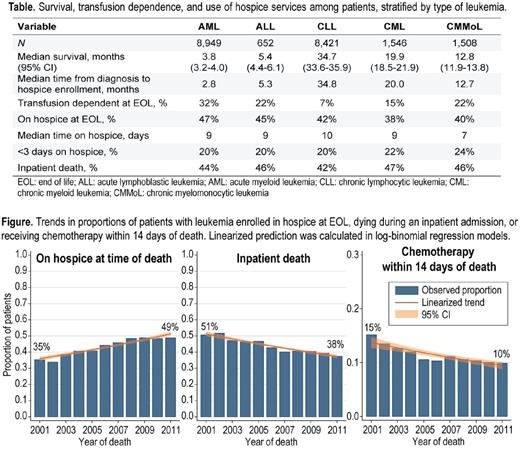Background: Patients (pts) with blood cancers use palliative and hospice services at end of life (EOL) less frequently than those with solid tumors. Some studies (El-Jawahri, Cancer, 2015; Odejide, Cancer, 2017) suggest that transfusion dependence (TD) may be a barrier to hospice enrollment, as hospice organizations typically disallow life-extending transfusion support. We sought to evaluate the association between TD and outcomes at EOL among Medicare beneficiaries with acute and chronic leukemias.
Methods: From the linked Surveillance, Epidemiology, and End Results (SEER)-Medicare database, we identified Medicare beneficiaries ≥65 years old with acute (myeloid or lymphoblastic) and chronic (lymphocytic, myeloid, or myelonomocytic) leukemias, who were diagnosed in 1996-2011 and died in 2001-2011, after >30 days from diagnosis. We defined TD as ≥2 transfusions (at least 5 days apart, inpatient or outpatient) within 30 days before death or hospice enrollment. Endpoints included use of hospice services at EOL and duration of hospice stay. We studied associations between endpoints and TD in robust Poisson models, reporting relative risk (RR) with 95% confidence intervals (CI). All models were adjusted for age, sex, race, marital status, poverty indicator, comorbidity index, poor performance status, prior dementia, year of death, and time from diagnosis to death. Cost of care at EOL was approximated as inflation-adjusted Medicare spending within 30 days before death.
Results: Among 21,076 eligible pts (median age 79 years, 44% women, 46% acute leukemias), 20% were TD before death/hospice enrollment (Table). TD pts were significantly younger, more often male, and more often had acute leukemia. Use of hospice at EOL increased from 35% in 2001 to 49% in 2011 (Ptrend<.0001), and was higher among pts with TD than those without it (47% versus [vs.] 43%, respectively, P <.0001). There was a reciprocal trend towards fewer inpatient deaths and chemotherapy use at EOL (Figure). Median time on hospice was 9 days, significantly shorter for TD pts (6 vs. 11 days, P <.0001), who were also more likely to receive hospice services for less than 3 days (27% vs. 19%, P <.0001). Hospice enrollees had a lower likelihood of inpatient death (3% vs. 75%), chemotherapy use in the last 14 days of life (5% vs. 16%), and lower median Medicare spending at EOL ($7,662 vs. $17,783) than non-enrollees.
Adjusting for baseline characteristics, TD was associated with a slightly higher likelihood of hospice enrollment (RR 1.07, 95%CI, 1.03-1.11), but also with a 51% shorter time on hospice (RR 0.49, 95%CI, 0.44-0.54), and a 38% higher risk of receiving hospice services for less than 3 days (RR 1.38, 95%CI, 1.26-1.52). These associations were similar for acute and chronic leukemia (Pinteraction>.05). TD was also associated with less frequent outpatient hospice referral in chronic (RR 0.73, 95%CI, 0.65-0.82) but not in acute leukemia (RR 0.96, 95%CI 0.90-1.03). The results were consistent in sensitivity analyses varying TD definition, or restricted to pts with leukemia recorded as cause of death (N=14,678).
Conclusions: Contrary to prior data in myelodysplastic syndrome (Fletcher, Cancer, 2016), we found more frequent use of hospice among Medicare beneficiaries with acute and chronic leukemias who were dependent on transfusions, suggesting that TD may correlate with severity of illness. However, markedly shorter time on hospice among TD pts indicates that the need for transfusion support may significantly delay hospice enrollment. Because use of hospice services is associated with lower use of resources and costs at EOL, allowing palliative transfusions for pts with terminal leukemia may maximize the benefits of hospice from both patients' and society's perspective. While hospice use in leukemias appears to be increasing, a large proportion of pts still die in the hospital. Hospice care increases the likelihood of dying at home, where most Americans say they prefer to be at the EOL.
LeBlanc: Pfizer: Consultancy; Celgene: Honoraria; AstraZeneca: Research Funding; Boehringer Ingelheim: Membership on an entity's Board of Directors or advisory committees; Seattle Genetics: Research Funding; Janssen: Honoraria; Flatiron Health: Consultancy; Cambia Health Foundation: Research Funding; Helsinn Therapeutics: Consultancy, Honoraria; Otsuka: Membership on an entity's Board of Directors or advisory committees; American Cancer Society: Research Funding.
Author notes
Asterisk with author names denotes non-ASH members.


This feature is available to Subscribers Only
Sign In or Create an Account Close Modal